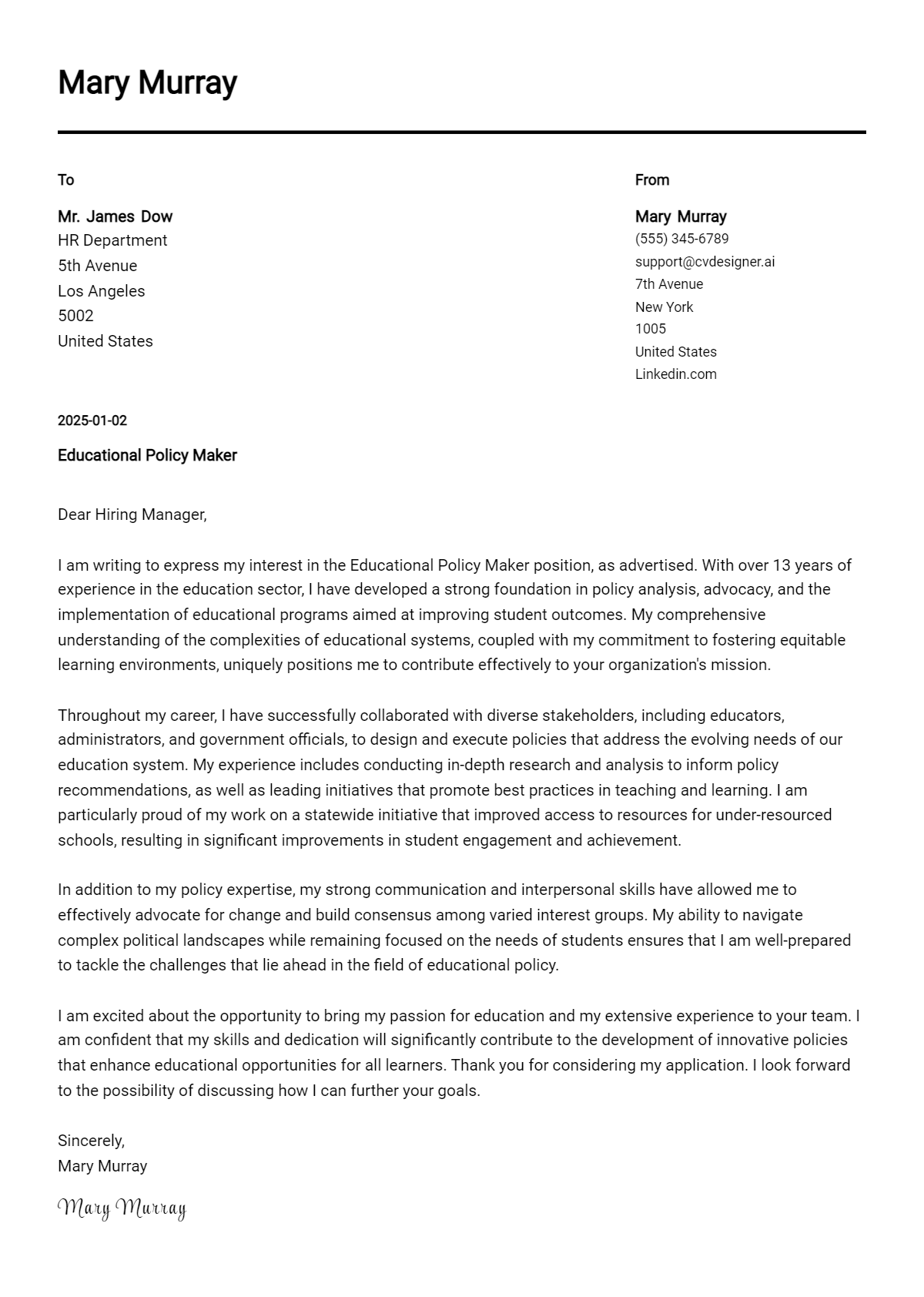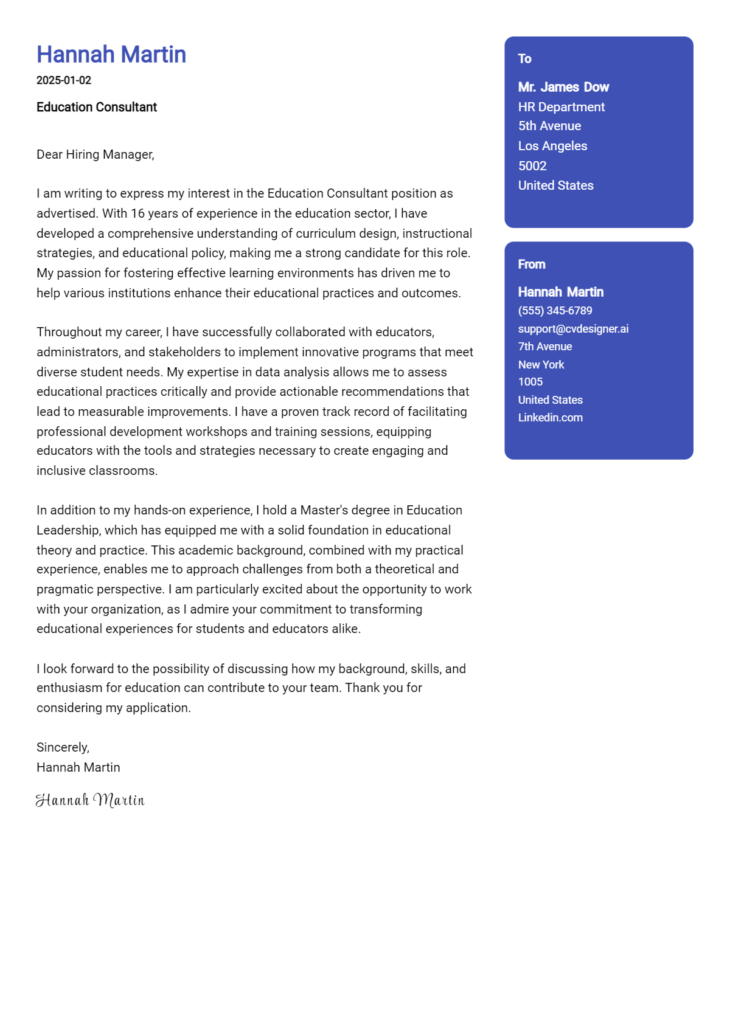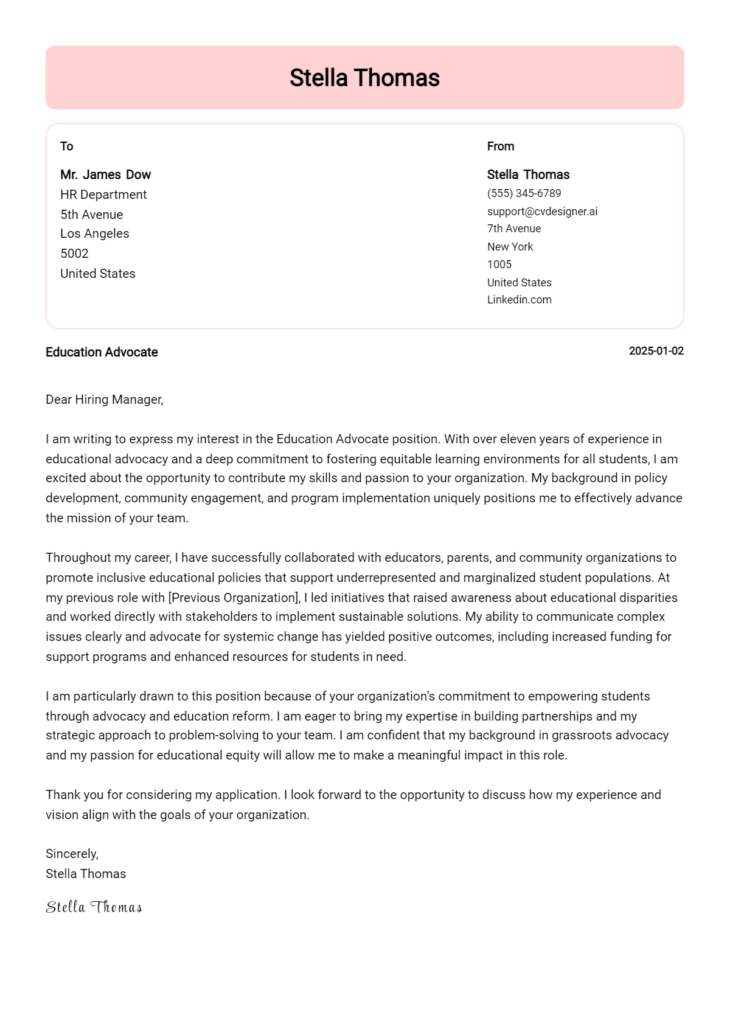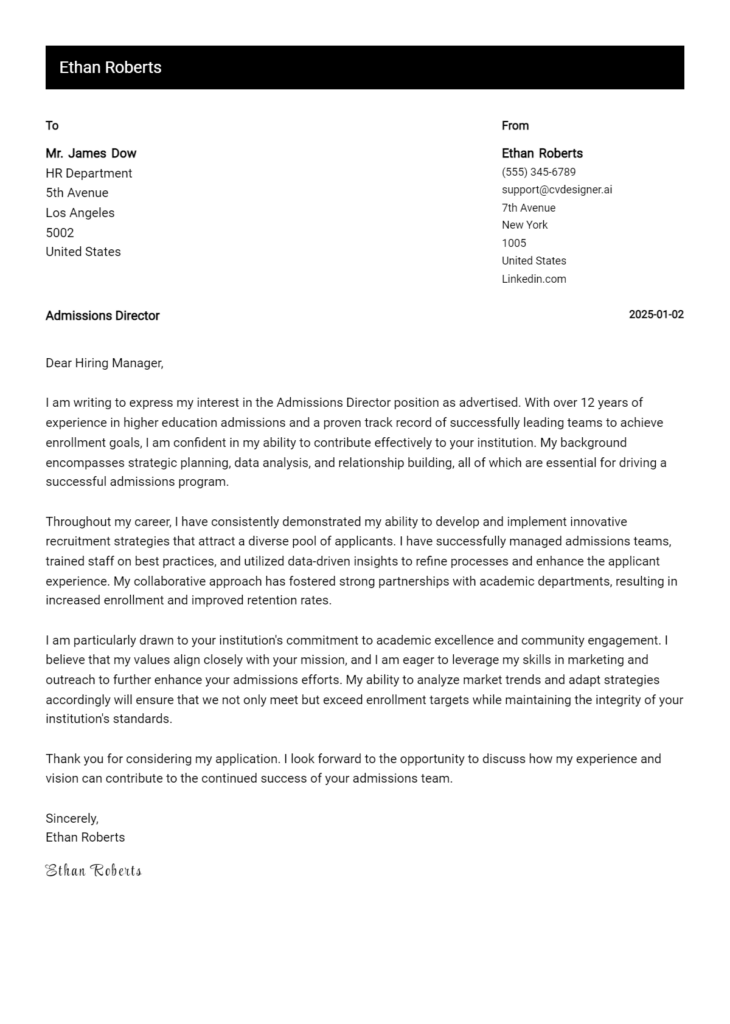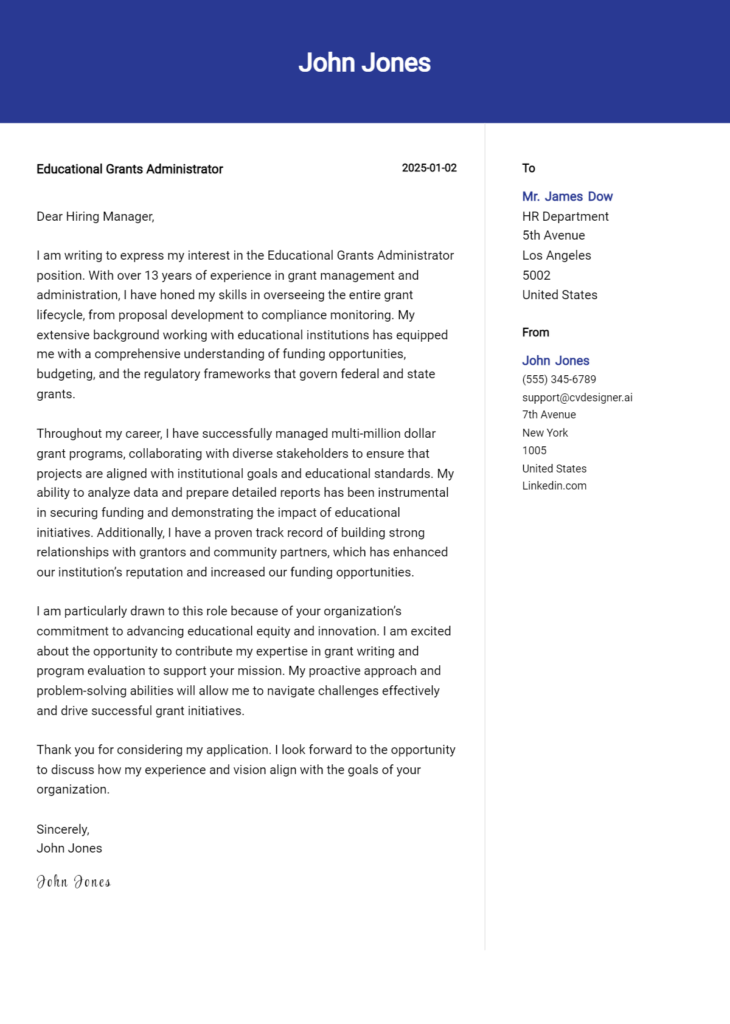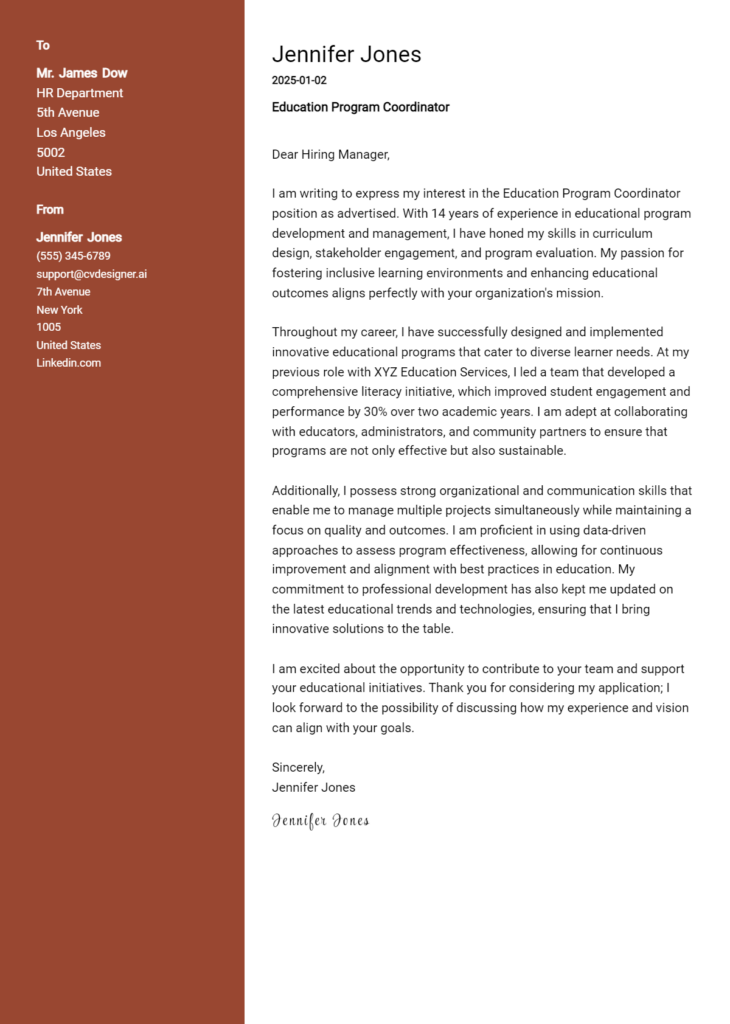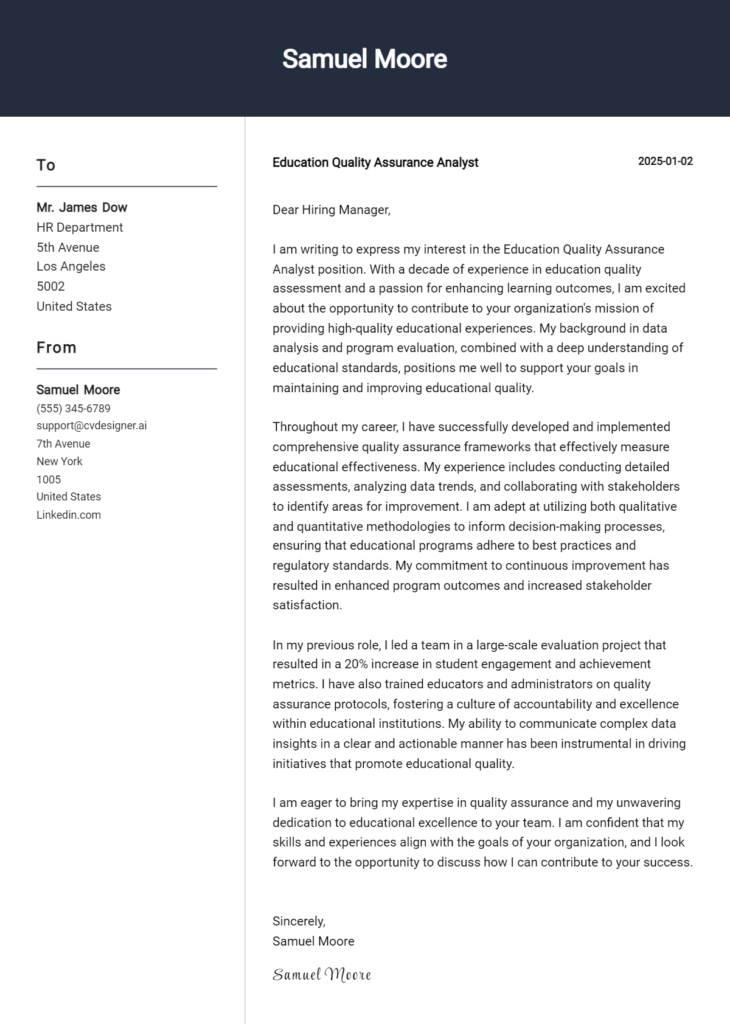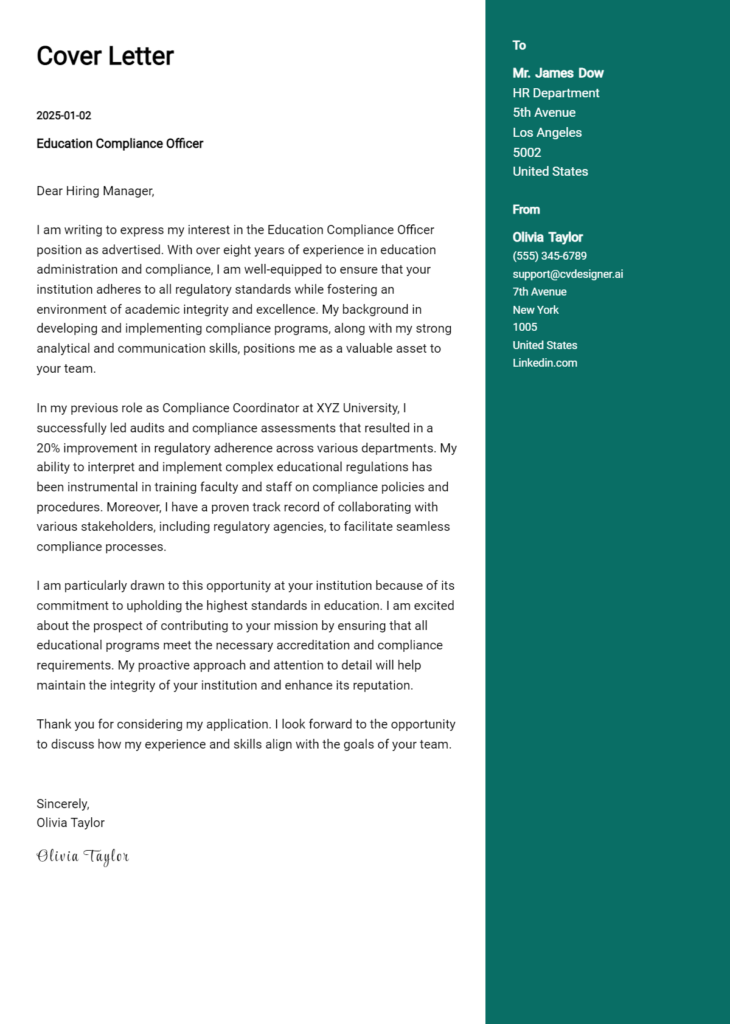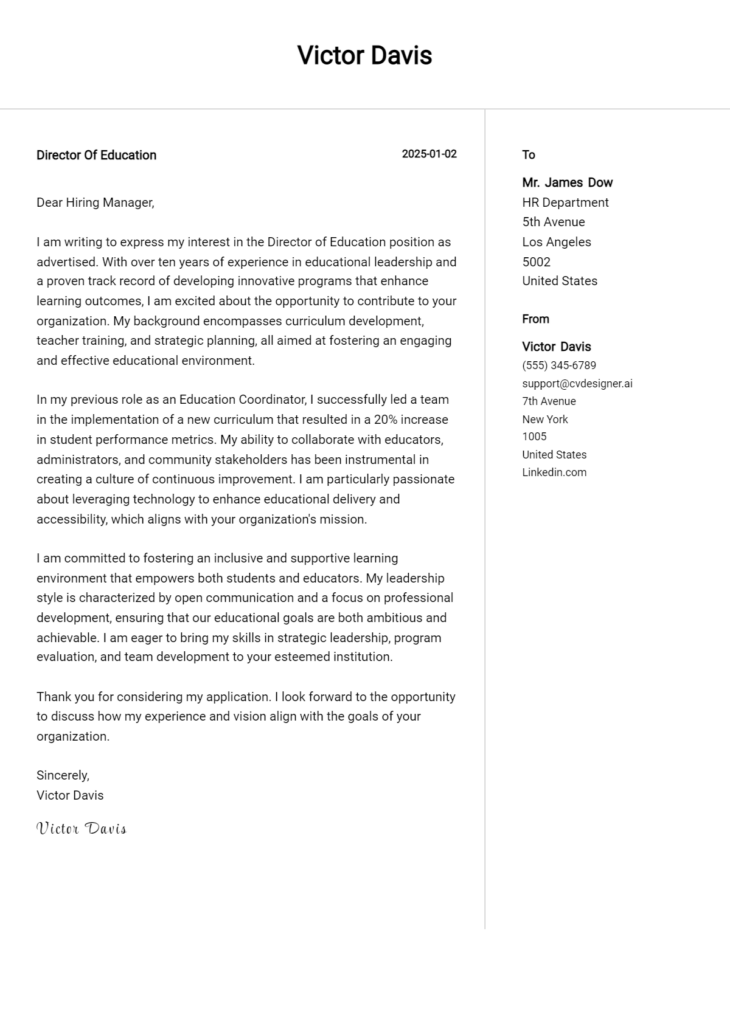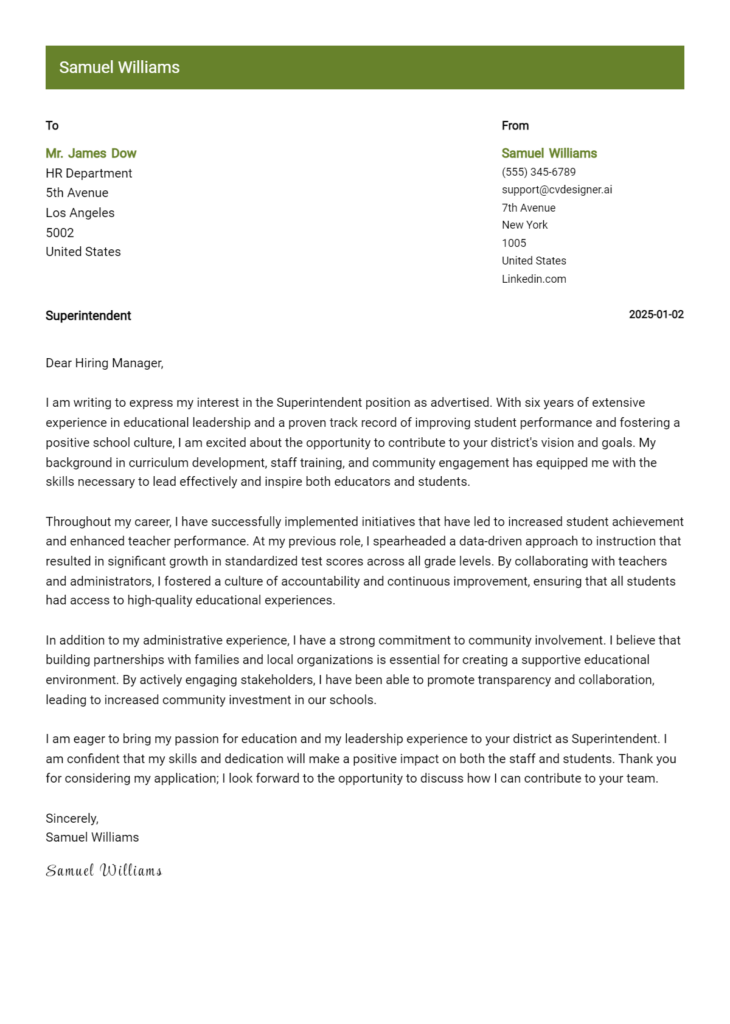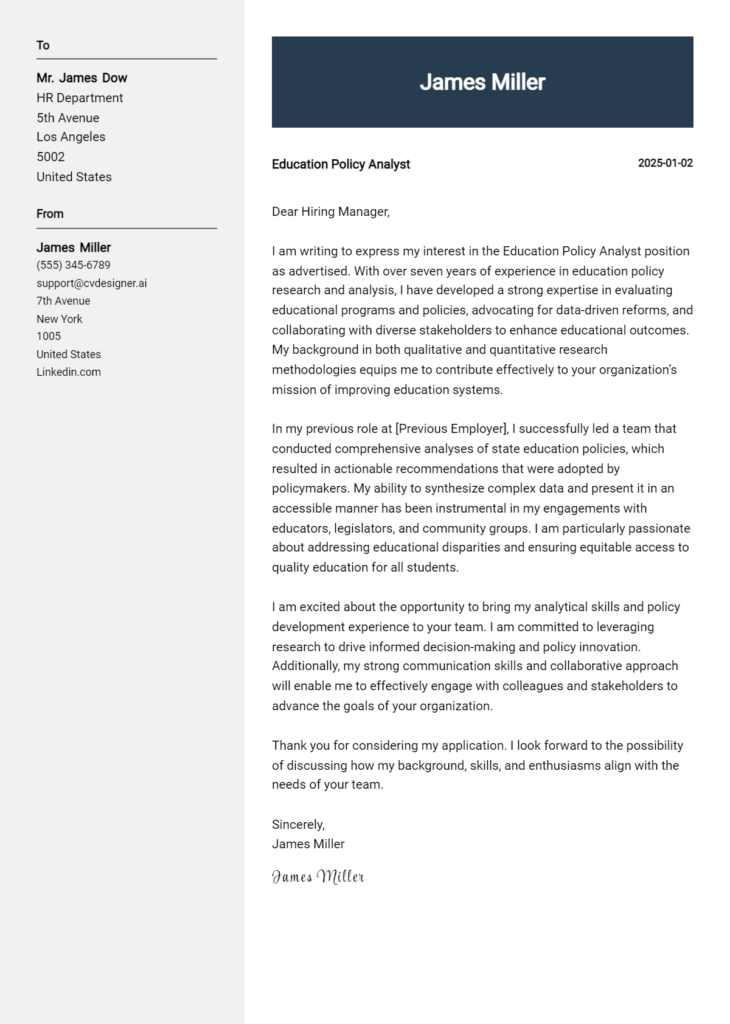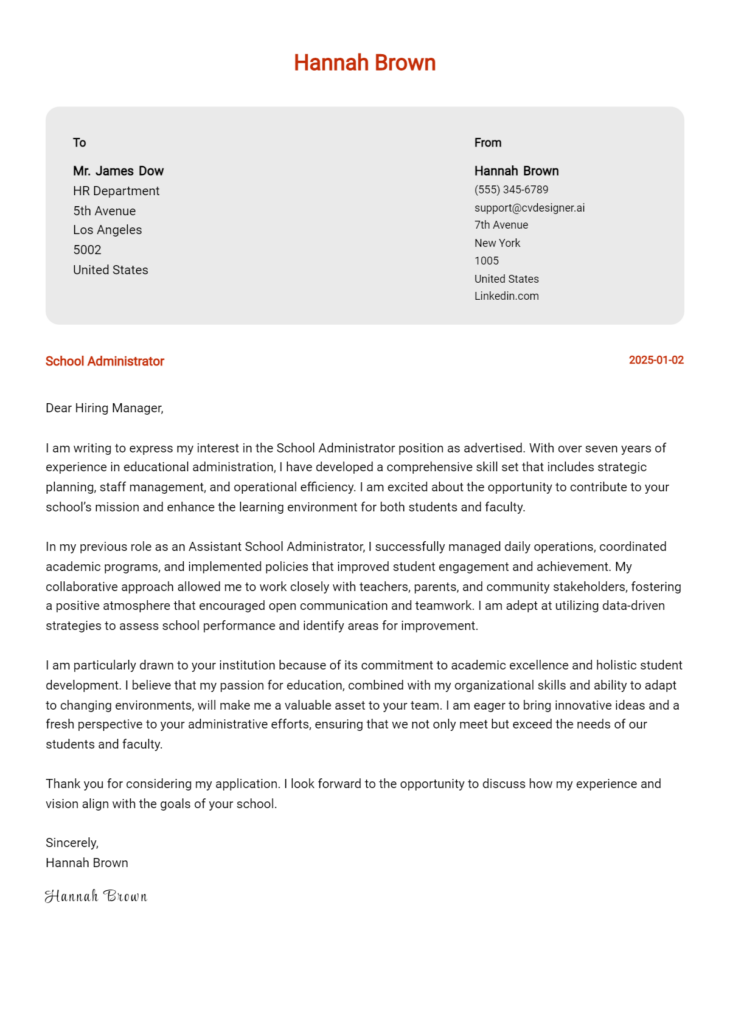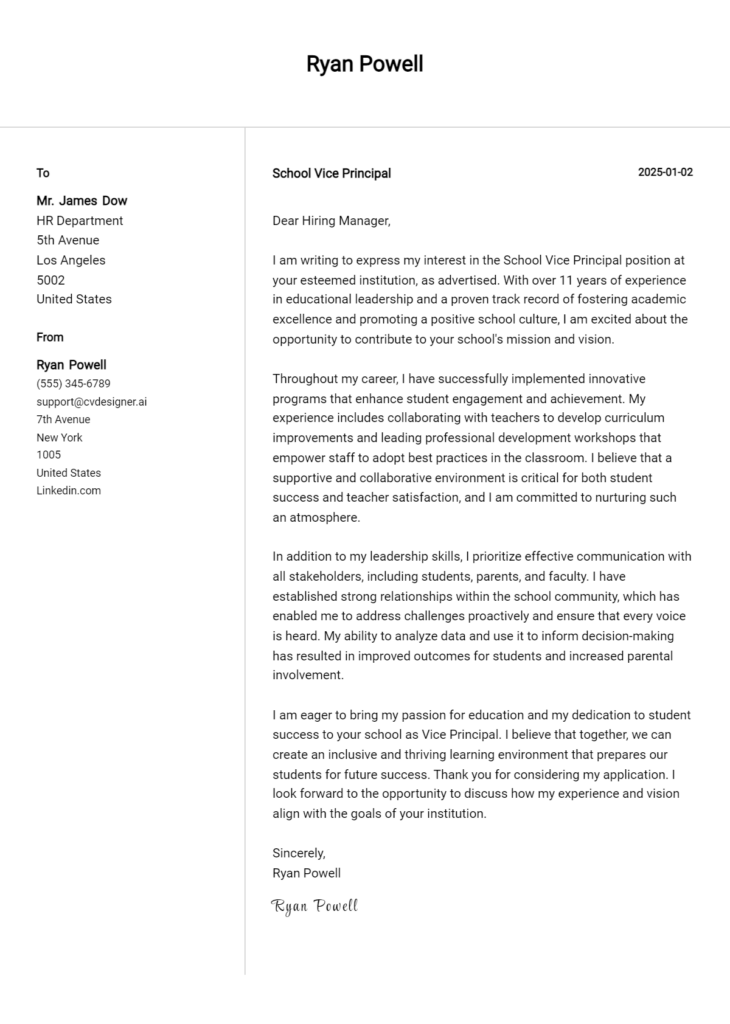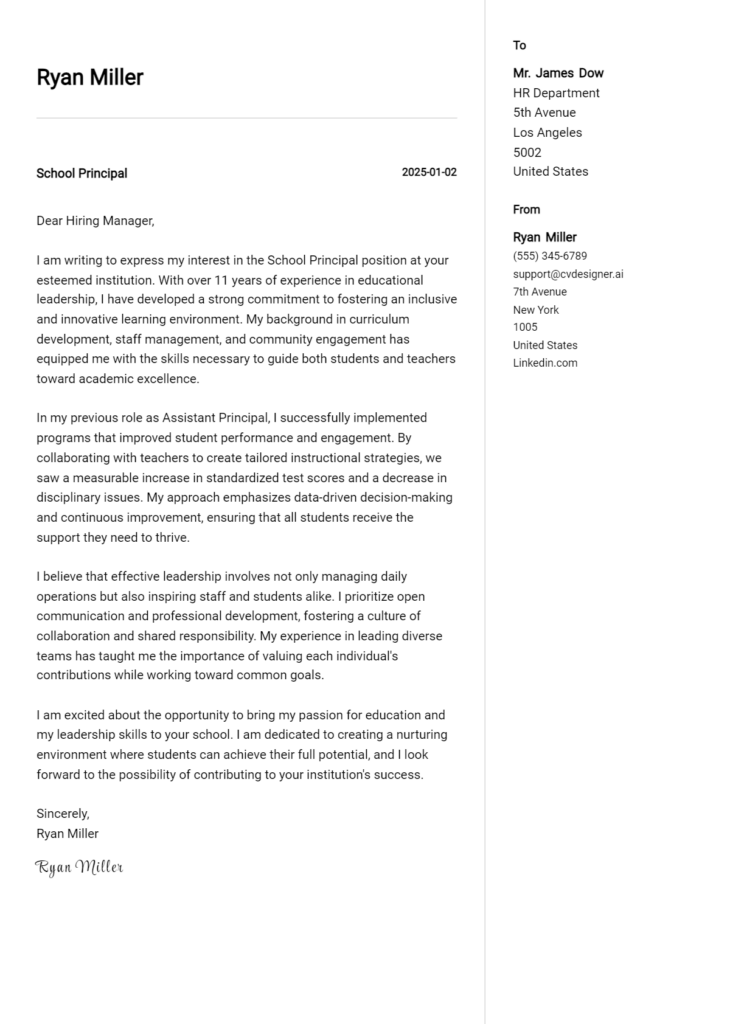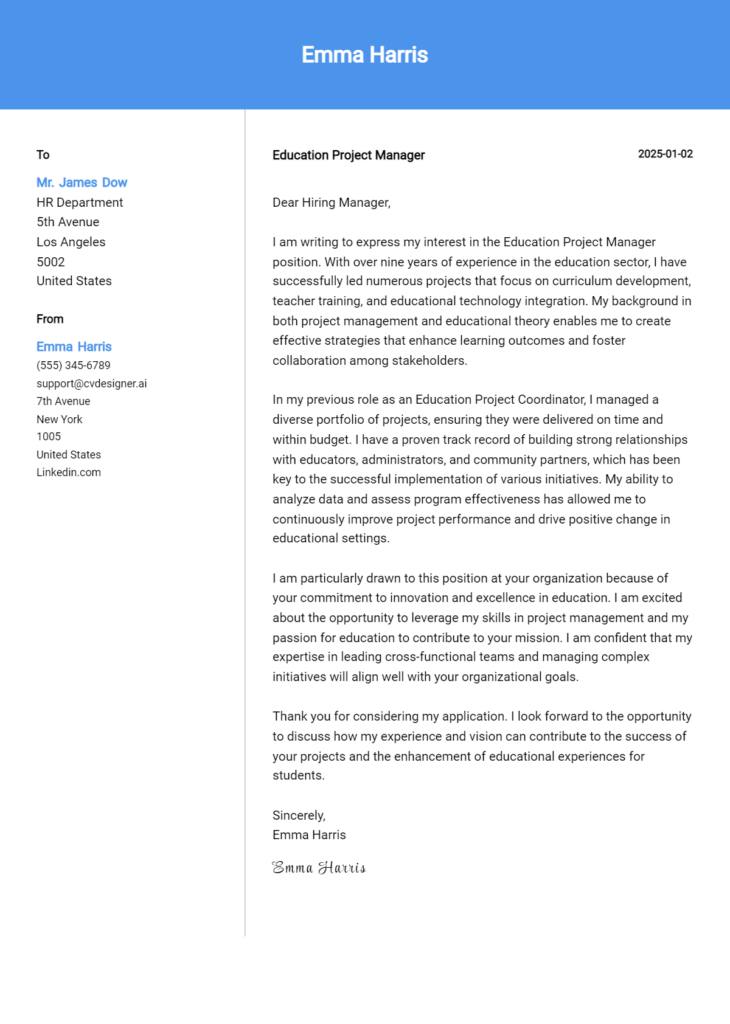Educational Policy Maker Cover Letter Examples
Explore additional Educational Policy Maker cover letter samples and guides and see what works for your level of experience or role.
How to Format an Educational Policy Maker Cover Letter?
Crafting a compelling cover letter is essential for an Educational Policy Maker, as it serves as your first impression to potential employers. The formatting of your cover letter not only showcases your qualifications but also reflects your ability to communicate effectively—an essential skill in the field of educational policy. A well-structured cover letter captures the attention of hiring managers and demonstrates your commitment to detail and clarity, traits that are vital for shaping educational frameworks and policies.
In this guide, we'll cover how to structure your cover letter, offering insights and examples tailored to the educational policy sector to help you create a persuasive document.
We'll focus on the essential components of a professional cover letter, including:
- Cover Letter Header
- Cover Letter Greeting
- Cover Letter Introduction
- Cover Letter Body
- Cover Letter Closing
Each section plays a crucial role in showcasing your qualifications and professionalism. Let’s break down each part and explain how to make your Educational Policy Maker cover letter stand out.
Importance of the Cover Letter Header for an Educational Policy Maker
The cover letter header is a critical component of your application as an Educational Policy Maker, as it sets the tone for your professionalism and attention to detail. It should include your contact information, the date, and the recipient's details, ensuring clarity and formality. A well-structured header not only makes it easy for the reader to identify who you are and how to reach you, but also reflects your understanding of formal correspondence. A strong header can make a positive first impression, while a weak one can detract from the overall effectiveness of your application.
Strong Example
Jane Doe 123 Policy Lane Education City, ST 12345 jane.doe@email.com (555) 123-4567 January 1, 2023 Mr. John Smith Director of Educational Policy Department of Education 456 Government Rd Capital City, ST 67890
Weak Example
jane doe email: jane.doe@email.com 1/1/23 To Whom It May Concern
Importance of the Cover Letter Greeting
The greeting of your cover letter serves as the initial point of contact with the hiring manager, setting the tone for the entire document. A well-crafted greeting not only demonstrates professionalism but also adds a personal touch by directly addressing the recipient. This approach shows that you have taken the time to research and understand the organization and its people. Generic greetings, such as "To Whom It May Concern," can make you appear disinterested or uninformed. To enhance your cover letter, make an effort to find out the name of the hiring manager or the person responsible for reviewing applications. If the name is not readily available, consider using professional networking sites or the organization's website to gather this information.
Strong and effective greetings can create an immediate connection, while weak or generic greetings may undermine your application from the start.
Strong Greeting Example
Dear Dr. Smith,
Weak Greeting Example
To Whom It May Concern,
The Importance of a Compelling Cover Letter Introduction for an Educational Policy Maker
A well-crafted cover letter introduction is crucial for an Educational Policy Maker as it serves as the first impression to hiring managers. This opening paragraph should not only capture attention but also express genuine interest in the role while succinctly showcasing relevant skills and achievements. An effective introduction sets the tone for the rest of the cover letter, compelling the reader to continue, whereas a weak introduction may fail to engage and miss the opportunity to highlight the candidate's qualifications.
Strong Example
Dear Hiring Manager, I am excited to apply for the Educational Policy Maker position at [Organization Name], where I hope to leverage my decade of experience in educational reform and policy advocacy. My recent success in implementing statewide curriculum changes led to a 20% increase in student engagement across diverse demographics, reflecting my commitment to equity in education. I am eager to contribute my strategic vision and collaborative approach to your team, ensuring that every student has access to high-quality education.
Weak Example
To Whom It May Concern, I am writing to apply for the Educational Policy Maker job that I found online. I have some experience in education, and I think I would do okay in this role. I hope you will consider my application.
Purpose of the Cover Letter Body for an Educational Policy Maker
The body of a cover letter for an Educational Policy Maker serves as a critical platform for candidates to articulate their relevant skills and experiences, demonstrating their potential value to the organization. It allows applicants to showcase specific projects or accomplishments that align with the objectives of the educational institution or governing body. By detailing successful initiatives—such as the implementation of a new curriculum, advocacy for policy changes, or collaboration with stakeholders—candidates can effectively illustrate their capacity to enhance educational outcomes and contribute to policy development. This narrative not only highlights their expertise but also positions them as a proactive and innovative addition to the team.
Strong Example
Dear Hiring Committee, I am excited to apply for the Educational Policy Maker position at XYZ Education Institute. In my previous role as a Senior Policy Analyst, I spearheaded a statewide initiative that successfully increased access to early childhood education for underserved communities, resulting in a 25% rise in enrollment over two years. My collaboration with local governments and educational organizations not only improved funding allocations but also enhanced program quality. Additionally, my research on the efficacy of educational reforms has been published in several peer-reviewed journals, showcasing my commitment to evidence-based policy development. I am eager to bring my expertise in stakeholder engagement and data-driven decision-making to your team, ensuring that we create equitable and effective educational policies for all students.
Weak Example
Dear Hiring Manager, I am writing to express my interest in the Educational Policy Maker position. I have some experience in education and policy work. I think I would be a good fit for your organization. I have worked on a few projects, but I can't remember all the details. I am passionate about education and want to help improve things. I believe I could contribute, but I need to learn more about your specific needs.
Importance of the Cover Letter Closing for an Educational Policy Maker
The closing paragraph of a cover letter is crucial as it serves to summarize your qualifications, reiterate your enthusiasm for the role, and encourage the hiring committee to take the next steps—such as reviewing your resume or scheduling an interview. A strong closing can leave a lasting impression, demonstrating your professionalism and eagerness to contribute to the educational landscape. Conversely, a weak closing may fail to convey your genuine interest or leave the reader unclear about your next steps.
Strong Example
Thank you for considering my application for the Educational Policy Maker position. With my extensive experience in educational reform and a proven track record of successful policy implementation, I am excited about the opportunity to contribute to your team. I am eager to discuss how my skills align with the goals of your organization. I look forward to the possibility of scheduling an interview to further explore how I can support your mission in advancing educational equity. Please find my resume attached for your review.
Weak Example
I hope you think about my application. I have some experience in education. If you want to talk, you can call me. My resume is probably attached.
These tips will assist candidates in crafting an effective cover letter tailored for the role of an Educational Policy Maker. A well-written cover letter not only highlights your qualifications but also demonstrates your commitment to enhancing educational systems through policy development. It's crucial to showcase your technical skills, problem-solving abilities, understanding of the Software Development Life Cycle (SDLC), teamwork, and a passion for continuous learning. By integrating these elements, you can create a compelling narrative that reflects your suitability for the position.
Cover Letter Writing Tips for Educational Policy Maker
Highlight Technical Skills: Clearly articulate your technical competencies relevant to educational policy, such as data analysis, policy evaluation, or educational technology. Use specific examples that demonstrate how you applied these skills to overcome challenges in previous roles. This not only showcases your expertise but also your readiness to tackle complex issues in the educational landscape.
Demonstrate Problem-Solving Abilities: Policy making often involves addressing multifaceted problems. In your cover letter, present instances where you identified a problem within an educational framework and the steps you took to resolve it. Emphasizing your analytical thinking and innovative solutions will illustrate your potential as an effective policy maker.
Showcase SDLC Knowledge: If your role involves integrating technology into education, mention your familiarity with the Software Development Life Cycle (SDLC). Discuss any projects where you contributed to educational software development or implementation, highlighting your understanding of how policies can guide successful tech integration in schools.
Emphasize Teamwork: Educational policy making is rarely a solo effort. Use your cover letter to provide examples of successful collaborations with educators, administrators, and stakeholders. Demonstrating your ability to work in teams and build consensus around policy initiatives will enhance your appeal as a candidate.
Express a Passion for Continuous Learning: The educational landscape is constantly evolving, and a commitment to lifelong learning is essential for an Educational Policy Maker. Mention any professional development courses, workshops, or conferences you have attended. This not only reflects your dedication but also your willingness to adapt to new ideas and practices in the field.
For more guidance on structuring your cover letter, consider exploring cover letter templates or utilizing a cover letter builder to streamline your writing process.
Common Mistakes to Avoid in an Educational Policy Maker Cover Letter
Crafting a compelling cover letter is essential for standing out in the competitive field of educational policy making. Avoiding common mistakes can significantly enhance your chances of making a positive impression. Here are some pitfalls to steer clear of:
Generic Greetings: Using “To Whom It May Concern” can come off as impersonal. Research the hiring manager's name to tailor your opening.
Lack of Specificity: Failing to detail your relevant experiences can make your application forgettable. Use specific examples from your past work that align with the job requirements.
Ignoring the Job Description: Not addressing the key qualifications listed can be detrimental. Ensure you mirror the language and skills highlighted in the job posting.
Too Lengthy or Too Brief: A cover letter that is overly lengthy can lose the reader’s attention, while one that is too short may seem like a lack of effort. Aim for a concise format that includes all necessary information; refer to a good cover letter format for guidance.
Overly Formal or Casual Tone: Striking the right balance in tone is crucial. Aim for a professional yet approachable voice that reflects your personality.
Neglecting Proofreading: Spelling and grammatical errors can undermine your credibility. Always proofread your letter or have someone else review it before submission.
Failure to Include a Call to Action: Not prompting the reader to follow up can leave your letter feeling incomplete. Conclude with a proactive statement expressing your eagerness to discuss your application further.
For more insights, consider reviewing cover letter examples to inspire your writing process.
Cover Letter FAQs for Educational Policy Maker
What should I include in my cover letter as an Educational Policy Maker?
In your cover letter, emphasize your relevant experience in educational policy development, implementation, and evaluation. Begin with a strong opening that states your interest in the position and highlights your most significant achievements in the field. Include specific examples that demonstrate your analytical skills and ability to engage with stakeholders, such as educators, government officials, and community members. Additionally, mention your understanding of current educational trends and policies. Conclude with a compelling statement about your passion for enhancing educational systems and your desire to contribute to the organization’s goals. Tailor your content to reflect the specific requirements of the job description to make a strong impression.
How do I tailor my cover letter for a specific job in educational policy?
To tailor your cover letter for a specific job in educational policy, start by thoroughly reviewing the job description and the organization's mission. Identify key skills and experiences the employer values and reflect on how your background aligns with these requirements. Use keywords from the job posting throughout your letter to demonstrate your fit for the role. Customize your introduction to mention the organization by name and express why you’re drawn to their initiatives. In the body of your letter, highlight relevant accomplishments and experiences that directly relate to the responsibilities outlined in the job description. Personalizing your cover letter shows that you have done your homework and are genuinely interested in the position.
How long should my cover letter be for an Educational Policy Maker position?
Your cover letter should ideally be one page long, consisting of three to four paragraphs. Aim for around 250-400 words to maintain conciseness while providing enough detail to showcase your qualifications. Start with a strong introduction that captures the reader's attention and clearly states the position you're applying for. The body should contain two or three paragraphs where you elaborate on your relevant experience, skills, and accomplishments. Finally, include a closing paragraph that reiterates your enthusiasm for the role and invites further discussion. Keeping it succinct and focused will help ensure that your cover letter remains engaging and impactful.
What tone should I use in my cover letter for an Educational Policy Maker role?
The tone of your cover letter should be professional, yet approachable. As an Educational Policy Maker, it's important to convey your expertise and confidence in the field while also demonstrating your ability to communicate effectively with diverse stakeholders. Use formal language, but avoid jargon or overly complex terminology that might alienate the reader. Balance professionalism with authenticity; let your passion for education and policy shine through. Additionally, ensure that your writing is clear and concise, with a focus on positive language that illustrates your accomplishments and ambitions. A well-crafted tone will help you establish a strong connection with the hiring committee.
Build your Cover Letter in minutes
Use an AI-powered cover letter builder and have your letter done in 5 minutes. Just select your template and our software will guide you through the process.

